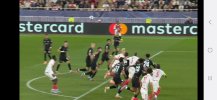You are using an out of date browser. It may not display this or other websites correctly.
You should upgrade or use an alternative browser.
You should upgrade or use an alternative browser.
AS Monaco (A) | CL | Post Match Thread
- Thread starter MCFC1993
- Start date
big gaz
Well-Known Member
Nico gave away the foul (very soft foul ) that led to this shit show so he fucked up twice ffsI don’t blame him at all but I do think Dier was clever and knew what he was doing. Nico didn’t give away the penalty Dier won it so if the same thing happened again I’d still expect Nico to try clear it then let the ball go past him in the box
Dribble
Well-Known Member
The reality is that there's always two professional teams on the pitch. We're not playing against training cones, so the opposition can't be discounted as being irrelevant in terms of our performances.We sure did, but how much 'control' did you feel with Lukaku's chance at the death?
Trouble with a one goal lead is a single deflected shot, worldie or iffy decision (definitely 1, maybe 2 out of 3 last night) and you've lost your lead...
The elite squad advantage we held for so long evaporated because of our negligence in not supercharging our succession planning efforts immediately after completing the treble. We're now seeing the ramifications of that negligence unfold.
Yes, I'd have loved us to slap Inter in the CL Final, but finals are rarely about performances, as the records will only reflect who won, who lost, & by what score.
Agreed, the bigger the score gap in matches, the less chance there is that an unfair penalty or a shock worldie will have a significant effect on the final result. However, "going for it" in a tight CL away game as opposed to managing the game, can potentially leave us open to counter attacks, where a breakaway, result-affecting goal could become a major possibility in a tight match. We have to box clever & be street smart.
We may have hit the goal frame three times last night, but the resulting draw moves us a point closer to qualification, as opposed to last season's car crash of a campaign where we needed a play-off.
We just need to fine tune our early season performances so we convert a higher percentage of our attempts on goal as the season progresses, & this is something I believe we're more than capable of achieving.
In seasons past, teams would've been terrified of venturing out of their half for fear of us destroying them. This new CL format has changed things, because the opposition now realises how important it is to win their home matches, instead of relying on away goals & goal difference. This has added a new level of jeopardy to the usually dull & predictable CL group phase, that few saw coming.
Unlike many others, I'm not setting myself up for disappointment by expecting the PL or CL title this season. Maybe the CC or FA Cup if we're fortunate, but that's about it.
That's not to say we're not capable of PL & CL success this season if things click, but from what I've seen so far, I don't see us returning to our dominant levels of the past until the earliest 2027-28.
Make no mistake about it, we're in a transitional season, & one where my personal ambition is for City to show clear signs of progress & to qualify for the CL next season, so we can build on that progression.
Last edited:
The correct law.Im sure you can find the correct rule. Since you were able to find the above.
Ok.Dont bother to thank me.
Let's go back to your original post.
You said "a raised foot near the head is called playing in a dangerous manner... A referee can call this foul even if no contact is made".In soccer, a raised foot near the head is a foul called "playing in a dangerous manner" or, more colloquially, a "high boot". A referee can call this foul even if no contact is made, as the action itself is a threat to a player's safety.
For those confused by the rules
I posted an extract from Law 11 which makes it clear that dangerous play is punishable by an INDIRECT FREE KICK. So in this instance, you are wrong.
Looking further down, as you have asked me to, Law 12 lists the offences that are punishable by a direct free kick (or a penalty kick). After it has listed the offences, Law 12 says "If an offence involves contact, it is penalised by a direct free kick." The very clear implication is that if an offence does not involve contact, a direct free kick or penalty kick cannot be awarded.
Superace
Well-Known Member
Yes but you stated about no one to blame, but my original post stands the ref was to blame for us not winning.Not over-analysing anything.
Plenty of matchea are also won by a single goal after a 2-goal lead has been reduced because of an unplanned moment.
blue by birth
Well-Known Member
It was actually Dier who made contact with Nico's shin..so not a foul not a penalty.No, read the rules book. If you do an overhead kick or bicycle kick with no opponents close enough to be hit its legal
Any raised leg that contacts an opponent in the face is an automatic foul. Dont understand why so many are pretending not to know this.
blue by birth
Well-Known Member
It wasntTrue. But for the infringement in question: "raised foot with contact" slowing down to ascertain contact was necessary. Besides at normal speed it looked like there was contact coz Dier jerked his head like he was shot or something. But the slowdown was realy to confirm he wasn't cheating us and buying the post event reaction by Dier.
He wasn't. It was a penalty.
blue by birth
Well-Known Member
It wasn't a foul ..bad decision by the ref..one of fucking many he madeNico gave away the foul (very soft foul ) that led to this shit show so he fucked up twice ffs
noseve
Well-Known Member
Fair enough Ace, we'll agree to disagree.Yes but you stated about no one to blame, but my original post stands the ref was to blame for us not winning.
One small correction - I didn't say that nobody was to blame, I said that nobody else was to blame.
I've lost any judgement, these days, with what is and isn't a penalty, so can understand both arguments as far as the penalty decision itself is concerned.
What I am convinced about is the idiocy of a previous decision, made by Nico to wave his leg around more than 6ft in the air in a crowded area, especially after that ref had already blown for a similar offence further up the pitch. That should have alerted the whole team to his interpretation of the rule.
I just don't like players making stupid decisions. It would have been fascinating to have been a fly on the wall after the match, to know the feelings among the players.
Last edited:
big gaz
Well-Known Member
Now there lies the big problemIt wasn't a foul ..bad decision by the ref..one of fucking many he made
blue by birth
Well-Known Member
The ref was fucking appalling..even Mrs BBB who was only half watching said " he's giving them everything"Now there lies the big problem
Mind you it was probably me shouting at the TV like a loon calling him a fucking bent **** lol
fathellensbellend
Well-Known Member
- Joined
- 30 Jul 2005
- Messages
- 4,971
He was fouled at Arsenal, but even then it was in their half and there were people far more culpable than him for their goal - Savinho didn't close down, Aké played him onside, Donnarumma miles off his line. Blaming him for that goal is just inaccurate
Never a foul, lost the ball in the wrong area, seconds later the ball is on our net
Dier is stooping and the contact is minimal, the foot is high and it's a tough decision to take. But if i'm honest, Gonzalez also reacted slowly to Dier's movement after the kick was taken, and Dier gets goal-side. This was poor. Dier did use centre half 'know-how' to use his body and arms to impede Gonzalez but Nico should be shoving his body full strength in the way or shoulder to shoulder Dier.
From the distance he was from goal, you would back Donnarumma, especially if Nico unsettles Dier's body position in any way. I thought going in with the foot in the box was naive.
Dier was Gvardiol's man

Lovebitesandeveryfing
Well-Known Member
Unlike many others, I'm not setting myself up for disappointment by expecting the PL or CL title this season. Maybe the CC or FA Cup if we're fortunate, but that's about it.
Personally, I'll be pleased with any trophy. I'll be over the moon if we get any trophy and top four qualification. In recent years, Liverpool have gone seasons without trophies. And Arsenal… oh, just last season, actually. It is the lot of most other clubs in the PL, year in, year out, decade in, decade out.
I want to see signs that the team and club behind the team are re-building. I'm seeing them.
Never a foul, lost the ball in the wrong area, seconds later the ball is on our net
Are you just misremembering it? Even if you don't think it's a foul, the ball was lost deep into their half. It's not losing it in the wrong area. They recycled it and Eze slowly advanced with it towards the centre circle, with no one challenging him. 16 seconds elapse between the challenge and the goal. If you want to blame that entirely on Nico, or at all, it's just incorrect
Attachments
cleavers
Moderator
He "reacted" to the situation, he didn't have 2 minutes to do a risk assessment, no footballer ever does.Well if his name was Matheus Nunes, you can bet your last penny the pile on would be immense.
Nico took a risk
The free kick given moments earlier was a poor decision from the referee, I think he actually got the penalty decision correct (didn't give it), then VAR took over and got him to re-referee it.
Dribble
Well-Known Member
Agreed 100%. We shot ourselves in the foot by delaying our succession planning, so this season & probably the next one too, is all about rebuilding, progression & CL qualification.Personally, I'll be pleased with any trophy. I'll be over the moon if we get any trophy and top four qualification. In recent years, Liverpool have gone seasons without trophies. And Arsenal… oh, just last season, actually. It is the lot of most other clubs in the PL, year in, year out, decade in, decade out.
I want to see signs that the team and club behind the team are re-building. I'm seeing them.
Anything on top of that is a bonus imo. However, if anyone's capable of earning that bonus, it's City, because of our recent elite experience if nothing else.
Yes.The correct law.
Ok.
Let's go back to your original post.
You said "a raised foot near the head is called playing in a dangerous manner... A referee can call this foul even if no contact is made".
Correct. For the foul without contact.I posted an extract from Law 11 which makes it clear that dangerous play is punishable by an INDIRECT FREE KICK. So in this instance, you are wrong.
Yes, which makes the point at issue " was there contact?"Looking further down, as you have asked me to, Law 12 lists the offences that are punishable by a direct free kick (or a penalty kick). After it has listed the offences, Law 12 says "If an offence involves contact, it is penalised by a direct free kick." The very clear implication is that if an offence does not involve contact, a direct free kick or penalty kick cannot be awarded.
Already we know Nico was in violation of the rules as shown in law 11 that you posted.
Ref missed it In real time. VAR checked and concluded there WAS contact. Hence why they called the ref to review. He then reviewed and reached the same conclusion. There was contact. Which takes a missed foul. ( The Raised boot) from an indirect kick ( non-penalty) to direck kick ( potential penalty) and thus, VAR reviewable.
If you saw contact, then there is only one conclusion.
I saw contact.
Again, my post was a spill over from the game thread. Whee many were arguing, " he got the ball first", "it was minimal contact", "Dier hit his shin with his knobby head", "cheating **** of a Ref" etc...
The rule as you've posted shows Nico's was a missed foul. Making contact, made it reviewable by VAR. Hence why each sequence in the decision making process was correct.
@Paladin bbb's sentiment above is an example of what my original post was getting at.It was actually Dier who made contact with Nico's shin..so not a foul not a penalty.
You have to start from the rule in law 11. You dont need contact to find a foul. A raised boot near a face is in of itself a foul.
So Nico was already in violation and his making contact made the action reviewable.
NorCalBlue
Well-Known Member
Pulling a shirt is an automatic foul, holding someone (let alone a bear hug) is an automatic foul, a goalkeeper holding the ball for more than 6 seconds is an automatic foul - that’s just off the top of my head - I could probably go on if I thought about it.No, read the rules book. If you do an overhead kick or bicycle kick with no opponents close enough to be hit its legal
Any raised leg that contacts an opponent in the face is an automatic foul. Dont understand why so many are pretending not to know this.
We’re way past the point of “it’s the rule so you can’t question it”.


